Riley Bailey, Grace Mappes, Kateryna Stepanenko, Angelica Evans, and Frederick W. Kagan
Ongoing antisemitic demonstrations in the Republic of Dagestan and elsewhere in the North Caucasus are highlighting heightened interethnic and interreligious tensions in Russia. Hundreds of demonstrators in Dagestan broke into Makhachkala airport, blocked the runway, and attempted to board a plane arriving from Israel on the evening of October 29 following the circulation of rumors that Russian authorities were planning to resettle “Israeli refugees” in Dagestan and elsewhere in the North Caucasus.[1] Hundreds of demonstrators gathered at a hotel in Khasavyurt, Dagestan on the evening of October 28 to look for suspected “Israeli refugees” based on similar rumors.[2] Unknown actors reportedly set fire to a Jewish cultural center under construction in Nalchik, Kabardino-Balkarian Republic on the night of October 28 to 29.[3]
The rumors appear to have originated with a local Dagestani Telegram channel, which claimed that “Israeli refugees” were staying at the hotel in Khasavyurt, Dagestan on October 28 and proceeded to announce plans for demonstrations that took place several hours later in the center of Makhachkala.[4] The Telegram channel called on Makhachkala residents to demonstrate at the airport on the night of October 28 and on October 29 and posted flight tracker data for the plane from Israel ahead of its arrival on the night of October 29.[5] Demonstrations are currently ongoing at the Makhachkala airport, where demonstrators temporarily blocked all individuals at the airport from leaving. Demonstrators also checked identification documents in search of Israeli citizens, although there are no reports of demonstrators finding any Israeli citizens.[6] Demonstrators have chanted “death to Jews” and have also occasionally gotten physical with security personnel at the airport.[7] Russian National Guard (Rosgvardia) elements have removed demonstrators from the premises of the airport, but crowds are still present outside of the airport.[8] The Telegram channel that spread the rumors is currently down, which may be the first indicator that Russian authorities are actively trying to suppress the continuation of the antisemitic demonstrations.
The Kremlin has yet to respond and appears to have left regional authorities to make an official response to the demonstrations. Dagestani Republic Head Sergei Melikov, Karachay Cherkess Republic Head Rashid Temrezov, and Kabardino-Balkarian Republic Head Kazbek Kokov called on residents of the North Caucasus earlier on October 29 to refrain from aggressive actions and to suppress attempts to incite interethnic hatred.[9] The Coordination Center for Muslims of the North Caucasus specifically denounced antisemitic actions following the initial demonstrations on the evening of October 28.[10] Dagestani Minister of National Policy Enrik Muslimov and Minister of Youth Kamil Saidov later arrived at the airport on October 29 to speak with demonstrators but appeared unable to dissuade them from breaking into the premises.[11] Melikov later called the demonstration a violation of the law and the Main Directorate of the Ministry of Internal Affairs (MVD) of the North Caucasus Federal District warned about the illegality of holding demonstrations without prior government approval.[12]
The Kremlin will likely struggle to reassure constituencies that the situation is under control and convince Jewish audiences that Jewish minorities are safe in Russia despite its efforts to present Russia as a religiously tolerant country. Spokesperson for Russia’s Chief Rabbinate in Dagestan Ovadya Isakov stated on October 29 that hundreds of Jewish families in Dagestan should leave Dagestan and Russia altogether because “Russia is not salvation” as “there were pogroms in Russia too.”[13] Russian President Vladimir Putin lauded Russia as a beacon of religious harmony at a meeting with leaders of several Russian religious organizations, including Jewish and Islamic faith leaders, on October 25.[14] The Kremlin likely aims to present Russia as protecting its religious minorities to curry favor with Muslim and Jewish audiences against the backdrop of the Israeli-Hamas war and to downplay tensions caused by the increasingly ultranationalist Russian Orthodox Church.[15]
Russian ultranationalists expressed concerns that antisemitic demonstrations will spread from Dagestan and the North Caucasus to elsewhere in Russia. Select Russian ultranationalists blamed the initial rumors on a Ukrainian information operation, but others expressed deep concerns that antisemitic activities may spread and that anti-Russian activities could begin.[16] One Russian milblogger rhetorically asked if there would be “pogroms" in Moscow and claimed that the demonstrations may lead to a situation reminiscent of the murders of ethnic Russians in Tajikistan and the Republic of Chechnya in the 1990s.[17] Russian ultranationalists may also begin to heavily criticize Russian authorities' response to the demonstrations, as several Russian sources bemoaned what they described as a lax official response so far.[18]
Russian Federal Security Service (FSB) Head Alexander Bortnikov and Russian Investigative Committee Head Alexander Bastrykin may be attempting to capitalize on heightened ethnoreligious tensions in Russia to regain favor with Russian President Vladimir Putin. Russian milbloggers observed that Russian officials failed to implement Putin’s 2012 policies incentivizing migration to Russia to fix Russia’s demographic issues.[19] The milbloggers complained that Putin’s policies, while well intended and correct, failed to increase the birth rates or reduce mortality rates to necessary levels and failed to properly integrate the migrants into Russian society and identity.[20] The milbloggers claimed that these policies will not change as long as older politicians from Putin’s generation remain in power. One milblogger explicitly named Bortnikov and Bastrykin as “trusted people” who must “fly into [Putin’s] orbit and personally convince him of the need to change [Russia’s] migration policy.”[21] This mention of Bortnikov and Bastrykin implies that they have fallen from Putin’s favor and portrays them as the people whom Putin needs to solve Russia’s recent ethnoreligious tensions involving Central Asian migrants. The Kremlin is typically slow to respond to events highlighting ethnoreligious tensions, including recent complaints of migrants attacking Russian children, often unintentionally fueling a cycle involving Russian ultranationalist anger at the Russian government for inaction that further exacerbates ethnoreligious tensions.[22] Bortnikov and Bastrykin may seek to portray themselves via the Russian information space as capable of breaking this cycle.[23]
Russian milbloggers claimed on October 29 that Airborne Forces (VDV) Commander Colonel General Mikhail Teplinsky replaced Colonel General Oleg Makarevich as the commander of the Russian “Dnepr” Grouping of Forces operating in the Kherson direction. The Russian Ministry of Defense (MoD) has not announced or confirmed reports of Makarevich’s dismissal at the time of this publication and is unlikely to do so given its tendency to regularly conceal high-profile military command changes.[24] One Russian blogger claimed that Russian President Vladimir Putin dismissed Makarevich during his recent visit to the Southern Military District (SMD) headquarters in Rostov-on-Don on October 19.[25] The blogger also claimed that Teplinsky was effectively demoted from his position as deputy overall theater commander, although it is unclear if Teplinsky still held this position.[26] A Kremlin-affiliated milblogger claimed that rumors about Makarevich’s dismissal emerged over the last week and that his removal was “long overdue” due to his handling of the military situation in the Kherson direction.[27] The milblogger added that Deputy Chief of the Russian General Staff Colonel General Alexei Kim effectively commands the entire Joint Grouping of Russian Forces in Ukraine.[28] ISW cannot independently verify these claims.
Makarevich’s reported dismissal indicates that the Kremlin or the Russian military command may be sufficiently worried and skeptical of his ability to repel recent larger-than-usual Ukrainian ground operations in east (left) bank Kherson Oblast. The Kremlin-affiliated milblogger claimed that a small Ukrainian “bridgehead” in Krynky (a settlement on east bank Kherson Oblast) likely triggered Makarevich’s removal.[29] Other Russian milbloggers reiterated similar theories, claiming that Makarevich’s negligence and extreme lack of command initiative enabled repeated Ukrainian landings on east bank Kherson Oblast.[30] One milblogger claimed that Ukrainian “bridgeheads” on east bank Kherson Oblast are setting a dangerous precedent and that Russian forces under Makarevich’s command were unable to adequately counter and respond to Ukrainian threats.[31]
Makarevich’s opponents, alternatively, may have been successful in convincing Russian President Vladimir Putin of Makarevich’s failure to command the Kherson direction against the backdrop of intensified Ukrainian ground attacks. A select group of Russian mibloggers previously accused Makarevich of failing to adequately command and equip Russian forces to respond to Ukrainian raids on east bank Kherson Oblast in summer 2023.[32] Some of these milbloggers notably praised Teplinsky and criticized Makarevich after he reportedly replaced Teplinsky as the VDV commander in winter 2023.[33] A Wagner Group-affiliated milblogger claimed that Makarevich was removed from his position after unspecified intelligence officials notified the Russian “high command” - possibly implying Putin - about Makarevich’s failure to provide accurate information about the situation in the area of his responsibility.[34] One Russian blogger also claimed that Russian milbloggers who have been fighting for Makarevich’s removal should rejoice.[35]
Ukrainian forces advanced near Bakhmut amid continued offensive operations near Bakhmut and in western Zaporizhia Oblast on October 29. Geolocated footage published on October 29 indicates that Ukrainian forces advanced over the railway line south of Andriivka (10km southwest of Bakhmut).[36] The Ukrainian General Staff reported that Ukrainian forces continued assault operations south of Bakhmut and continued offensive operations in the Melitopol (western Zaporizhia Oblast) direction.[37] A prominent Russian milblogger claimed that Ukrainian forces established control over unspecified positions in the Zaporizhia direction (western Zaporizhia Oblast) over the past week.[38]
The New York Times (NYT) reported that US officials will send Ukraine hybrid air defense systems in fall 2023.[39] The NYT cited US officials talking about the so-called FrankenSAM systems that that merge advanced Western air defense missiles with modified Soviet launchers or other missile launchers that Ukraine already possesses.[40] The FrankenSAM combinations include modified Soviet Buk launchers and American Sea Sparrow missiles, Soviet-era radars and American Sidewinder missiles, and Cold War-era Hawk systems.[41] The NYT reported that the US is testing a FrankenSAM combination of a Patriot missile and a Ukrainian domestically produced radar system.[42] US Deputy Assistant Secretary of Defense for Russia, Ukraine and Eurasia Policy Laura Cooper stated that the FrankenSAMs contribute to filling critical gaps in Ukrainian air defenses.[43]
Unspecified actors may have purposefully conspired to shut down a prominent Russian Airborne Forces (VDV)-affiliated milblogger. A Russian VDV-affiliated milblogger announced on October 28 that he was forced to shut down his Telegram channel, implying that unspecified actors abducted the raccoon that the milblogger had been using as a mascot to help gain notoriety and fundraise for Russian forces.[44] The milblogger claimed that the channel generated over 20 million rubles ($212,000) for Russian forces within a year.[45] The raccoon gained fame when Russian forces stole it from a zoo when withdrawing from west (right) bank Kherson Oblast in November 2022.[46] The Russian Ministry of Defense (MoD) has increasingly targeted Russian milbloggers in censorship and self-censorship campaigns, and it is possible that MoD-affiliated actors aimed to censor this milblogger.[47] The milblogger claimed that “traitors” abducted the raccoon and left occupied Ukraine and suggested that the milblogger may have personally known who took the animal, however.[48] Ukrainian Kherson Oblast Military Administration Advisor Serhiy Khlan stated that the raccoon had previously attacked Kherson Oblast occupation head Vladimir Saldo and criticized the Russians for losing the raccoon.[49] ISW is unable independently to confirm reports of the raccoon’s whereabouts or actions.
The Russian information space continues to debate the future of the Wagner Group’s remaining personnel. Wagner-affiliated Russian milbloggers claimed on October 28 that the Wagner Group is officially a detachment of Rosgvardia and will retain its structures and commanders.[50] The milbloggers claimed that Rosgvardia is encouraging active and reserve Wagner personnel to sign contracts with Rosgvardia, including six-month contracts for service in Ukraine or nine-month contracts for service in Belarus, the Middle East, Africa, or Latin America. A smaller group of Wagner-affiliated Russian milbloggers denied recent reports that large groups of former Wagner personnel are joining Chechen ”Akhmat” Spetsnaz units in Russia or the Russian Ministry of Defense’s (MoD’s) Expeditionary Force in Syria.[51] Chechen Republic Head Ramzan Kadyrov posted footage on October 29 claiming to show “Akhmat” Commander Apty Alaudinov and Russian State Duma Deputy Nikolai Brykin welcoming 170 former Wagner fighters to “Akhmat” units.[52]
Key Takeaways:
- Ongoing antisemitic demonstrations in the Republic of Dagestan and elsewhere in the North Caucasus are highlighting heightened interethnic and interreligious tensions in Russia.
- The Kremlin has yet to respond and appears to have left regional authorities to make an official response to the demonstrations.
- The Kremlin will likely struggle to reassure constituencies that the situation is under control and convince Jewish audiences that Jewish minorities are safe in Russia despite its efforts to present Russia as a religiously tolerant country.
- Russian ultranationalists expressed concerns that antisemitic demonstrations will spread from Dagestan and the North Caucasus elsewhere in Russia.
- Russian Federal Security Service (FSB) Head Alexander Bortnikov and Russian Investigative Committee Head Alexander Bastrykin may be attempting to capitalize on heightened ethnoreligious tensions in Russia to regain favor with Russian President Vladimir Putin.
- Russian milbloggers claimed on October 29 that Airborne Forces (VDV) Commander Colonel General Mikhail Teplinsky replaced Colonel General Oleg Makarevich as the commander of the Russian “Dnepr” Grouping of Forces operating in the Kherson direction.
- Ukrainian forces advanced near Bakhmut amid continued offensive operations near Bakhmut and in western Zaporizhia Oblast on October 29.
- The New York Times (NYT) reported that US officials will send Ukraine hybrid air defense systems in fall 2023.
- Unspecified actors may have purposefully conspired to shut down a prominent Russian Airborne Forces (VDV)-affiliated milblogger.
- The Russian information space continues to debate the future of the Wagner Group’s remaining personnel.
- Russian forces continued offensive operations along the Kupyansk-Svatove line, near Bakhmut, near Avdivvka, west and southwest of Donetsk City, in the Donetsk-Zaporizhia Oblast border area, and in western Zaporizhia Oblast and advanced west of Donetsk City.
- Russian milbloggers claimed that Russian forces have begun deploying a new electronic warfare (EW) data station system in Ukraine.
- Russian military personnel continue to commit violent crimes in occupied Ukraine
We do not report in detail on Russian war crimes because these activities are well-covered in Western media and do not directly affect the military operations we are assessing and forecasting. We will continue to evaluate and report on the effects of these criminal activities on the Ukrainian military and the Ukrainian population and specifically on combat in Ukrainian urban areas. We utterly condemn Russian violations of the laws of armed conflict and the Geneva Conventions and crimes against humanity even though we do not describe them in these reports.
- Russian Main Effort – Eastern Ukraine (comprised of two subordinate main efforts)
- Russian Subordinate Main Effort #1 – Capture the remainder of Luhansk Oblast and push westward into eastern Kharkiv Oblast and encircle northern Donetsk Oblast
- Russian Subordinate Main Effort #2 – Capture the entirety of Donetsk Oblast
- Russian Supporting Effort – Southern Axis
- Russian Mobilization and Force Generation Efforts
- Activities in Russian-occupied areas
- Russian Information Operations and Narratives
Russian Main Effort – Eastern Ukraine
Russian Subordinate Main Effort #1 – Luhansk Oblast (Russian objective: Capture the remainder of Luhansk Oblast and push westward into eastern Kharkiv Oblast and northern Donetsk Oblast)
Russian forces continued offensive operations along the Kupyansk-Svatove line on October 29 but did not make any confirmed gains. The Ukrainian General Staff reported that Ukrainian forces repelled more than seven Russian assaults near Synkivka (9km northeast of Kupyansk) and Ivanivka (21km southeast of Kupyansk).[53] Ukrainian Ground Forces Command Spokesperson Lieutenant Colonel Volodymyr Fityo stated that Ukrainian forces also repelled assaults near Petropavlivka (7km east of Kupyansk) over the past day.[54] The Ukrainian General Staff reported that Russian forces did not conduct offensive actions in the Lyman direction and continued regrouping in the area.[55] A Russian media aggregator claimed that Russian forces advanced near Makiivka (21km southwest of Svatove) on October 28, although ISW has not observed confirmation of this claim.[56] A Russian milblogger claimed that Russian forces made tactical gains near Stepova Novosilka (18km southeast of Kupyansk) and small gains near Dibrova (7km southwest of Kreminna) in the past week.[57]
Russian sources claimed that Ukrainian forces conducted unsuccessful ground attacks along the Kupyansk-Svatove-Kreminna line on October 29. The Russian Ministry of Defense (MoD) claimed that elements of the Russian Western Grouping of Forces repelled two Ukrainian assaults near Synkivka and Nadiya (14km southwest of Svatove) and that elements of the Russian Central Grouping of Forces repelled five Ukrainian assaults near Yampolivka (17km west of Kreminna) and Dibrova.[58] A Russian milblogger claimed that Russian forces also repelled a Ukrainian assault near Hryhorivka (11km south of Kreminna).[59]
Russian Subordinate Main Effort #2 – Donetsk Oblast (Russian objective: Capture the entirety of Donetsk Oblast, the claimed territory of Russia’s proxies in Donbas)
Ukrainian forces continued offensive operations near Bakhmut and made confirmed advances on October 29. Geolocated footage published on October 29 indicates that Ukrainian forces advanced east of the railway line south of Andriivka (10km southwest of Bakhmut).[60] The Ukrainian General Staff reported that Ukrainian forces continued assaults south of Bakhmut.[61] The Russian Ministry of Defense (MoD) claimed that Russian forces repelled Ukrainian attacks in the Donetsk direction, which includes the Bakhmut area and the Avdiivka-Donetsk City area.[62] A Kremlin-affiliated Russian milblogger claimed that Ukrainian forces attacked near Klishchiivka (7km southwest of Bakhmut), attempting to cross the railway line near the settlement.[63]
Russian forces attacked near Bakhmut but did not make confirmed advances on October 29. The Ukrainian General Staff reported that Russian forces unsuccessfully attacked near Khromove (immediately west of Bakhmut), Klishchiivka, and Andriivka.[64] A Kremlin-affiliated Russian milblogger claimed that Russian forces attempted to regain lost positions near Klishchiivka and Andriivka and pushed Ukrainian forces from positions near the Berkhivka reservoir (about 2km northwest of Bakhmut) over the past week.[65] Another Kremlin-affiliated Russian milblogger claimed that there were positional battles south of Bakhmut.[66]
Russian forces continued offensive operations near Avdiivka but did not make confirmed advances on October 29. The Ukrainian General Staff reported that Ukrainian forces repelled Russian attacks near Keramik (10km northwest of Avdiivka), Stepove (8km northwest of Avdiivka), Novokalynove (7km north of Avdiivka), Avdiivka, Tonenke (5km west of Avdiivka), Opytne (3km southwest of Avdiivka), and Pervomaiske (11km southwest of Avdiivka).[67] A Russian milblogger claimed that Russian forces are preparing to attack the Avdiivka Coke Plant immediately north of Avdiivka.[68] A Russian news aggregator claimed that Russian forces consolidated positions at the Avdiivka waste heap on October 28 and are gradually advancing south of Avdiivka and near Sieverne (6km west of Avdiivka).[69] Russian milbloggers claimed that elements of the Russian 1st Motorized Rifle Brigade (1st Donetsk People’s Republic [DNR] Army Corps) are operating in the Vodyane-Sieverne-Tonenke area (7km southwest to 5km west of Avdiivka) and recently advanced north from this area.[70] The milbloggers claimed that elements of the Russian 255th Motorized Rifle Regiment (20th Guards Motorized Rifle Division, 8th Combined Arms Army [CAA], Southern Military District [SMD]) advanced 500 meters north of the N20-E50 highway junction (approximately 2km east of Avdiivka). The milbloggers noted that the Russian command recently transferred elements of the 2nd Luhansk People’s Republic (LNR) Army Corps and the 41st CAA (Central Military District) to the Avdiivka direction to reinforce the 1st DNR Army Corps and 8th CAA elements.
Russian forces appear to have concentrated a sizable portion of their combat power around Avdiivka. Ukrainian Tavriisk Group of Forces Spokesperson Colonel Oleksandr Shtupun stated on October 29 that Russia currently has 40,000 personnel in the Avdiivka direction and is transferring additional manpower to the area.[71] Ukrainian military observer Kostyantyn Mashovets estimated on October 28 that Russian forces have elements of 12 separate motorized rifle brigades, 16 separate rifle regiments of the mobilization reserve, 22 separate rifle battalions of the mobilization reserve, 11 separate tank battalions, a separate motorized rifle battalion, and three consolidated tactical detachments at the battalion level including BARS (Russian Combat Army Reserve) and Storm Z units operating in the Avdiivka direction, theoretically totaling well over 40,000 Russian personnel.[72] ISW has routinely assessed that Russian military units are likely generally undermanned and may be battalions, brigades, or regiments in name only with smaller personnel complements than their echelon designations would suggest.[73] Mashovets added that Russian forces likely have three motorized rifle regiments, seven reserve motorized rifle battalions, and two BARS units in reserve in this direction.[74]
Russian sources claimed that Ukrainian forces counterattacked near Avdiivka on October 29 but did not make any claimed or confirmed advances. A Russian milblogger claimed that Ukrainian forces counterattacked near the Avdiivka waste heap but do not control the waste heap.[75] A Kremlin-affiliated Russian milblogger claimed that Ukrainian forces counterattacked near Spartak (4km south of Avdiivka) over the past week.[76]
Russian forces attacked west and southwest of Donetsk City and made a confirmed advance on October 29. Geolocated footage published on October 29 indicated that Russian forces advanced south of Krasnohorivka (directly west of Donetsk City).[77] The Ukrainian General Staff reported that Ukrainian forces repelled Russian attacks near Marinka (directly west of Donetsk City) and Novomykhailivka (20km southwest of Donetsk City).[78] A Russian news aggregator claimed that Russian forces achieved unspecified success near Novomykhailivka on October 28.[79] A Russian milblogger amplified footage on October 29 of elements of the Russian 33rd Motorized Rifle Regiment (20th Motorized Rifle Division, 8th CAA, SMD) operating near Marinka.[80]
Ukrainian forces did not conduct any claimed or confirmed attacks west or southwest of Donetsk City on October 29.
Russian Supporting Effort – Southern Axis (Russian objective: Maintain frontline positions and secure rear areas against Ukrainian strikes)
Ukrainian forces reportedly conducted limited ground attacks in the Donetsk-Zaporizhia Oblast border area on October 29 but did not make any confirmed advances. The Russian Ministry of Defense (MoD) claimed that Ukrainian forces attacked near Urozhaine and Staromayorske (both about 9km south of Velyka Novosilka).[81] The Russian ”Vostok” Battalion claimed that Ukrainian forces intensely shelled Russian positions in the Donetsk-Zaporizhia Oblast border area overnight on October 28-29.[82]
Russian forces continued to counterattack in the Donetsk-Zaporizhia Oblast border area on October 29 but did not advance. The Ukrainian General Staff reported that Ukrainian forces repelled Russian assaults near Staromayorske and Zolota Nyva (11km southeast of Velyka Novosilka).[83] Russian sources claimed that Russian forces attacked near Staromayorske and west of Novodonetske (12km southeast of Velyka Novosilka).[84]
Ukrainian forces continued offensive operations in western Zaporizhia Oblast but did not make any confirmed advances on October 29.[85] A prominent Russian milblogger claimed that Ukrainian forces managed to establish stable control over some unspecified Russian positions in the Zaporizhia direction and tried to expand offensive operations closer to Nesteryanka (12km northwest of Robotyne), Kopani (6km northwest of Robotyne), and in the direction of Novofedorivka (15km northeast of Robotyne) in the past week.[86] The milblogger added that Ukrainian forces also tried to advance towards Novoprokopivka (just south of Robotyne) and Verbove (9km east of Robotyne).[87] Another prominent Russian miblogger claimed that the intensity of hostilities in the Zaporizhia direction decreased but that Ukrainian forces continue efforts to break through Russian defenses on the Kopani-Robotyne line.[88] Russian milbloggers also claimed that Ukrainian forces continued to strike Russian-occupied Tokmak (43km northeast of Melitopol), Vasylivka (60km north of Melitopol), and an unspecified highway.[89]
Russian forces unsuccessfully attacked Ukrainian positions in western Zaporizhia Oblast on October 29. A prominent Russian milblogger claimed that Russian forces counterattacked near Robotyne.[90] The Ukrainian General Staff reported that Ukrainian forces repelled Russian attacks on Robotyne and west of Verbove.[91]
Russian milbloggers claimed that Ukrainian forces maintain positions on east (left) bank Kherson Oblast and continued cross-river raids on October 29. A prominent Russian milblogger claimed that Ukrainian forces unsuccessfully tried to advance towards Pishchanivka (14km east of Kherson City and 3km from the Dnipro River coast) and maintained a small “bridgehead” near Krynky (30km northeast of Kherson City and 2km from the Dnipro River coast).[92] A Kremlin-affiliated milblogger claimed that Ukrainian forces do not have a stable “bridgehead,” however.[93] The milblogger added that Russian forces intercepted a Ukrainian landing in the Dachi area (10km southwest of Kherson City). Another Russian milblogger claimed that Ukrainian forces are crossing the Dnipro River in groups of 50 to 70 people in three directions.[94] Russian sources also indicated that Ukrainian forces continue to operate along the small railway bridge on the east bank of the Dnipro River.[95]
Ukrainian Southern Operational Command Spokesperson Captain First Rank Nataliya Humenyuk reported that Russian forces used 30 KAB guided bombs to strike west (right) bank Kherson Oblast.[96]
The Russian MoD claimed that Russian air defenses shot down 36 drones over the Black Sea and northwestern Crimea overnight on October 28 to 29.[97]
Russian Mobilization and Force Generation Efforts (Russian objective: Expand combat power without conducting general mobilization)
Russian milbloggers claimed that Russian forces have begun deploying a new electronic warfare (EW) data station system in Ukraine. Russian milbloggers claimed that an unspecified French intelligence report reported that Russian forces began the large-scale deployment of the “Bylina” EW data station system that can reportedly coordinate the operations of dozens of systems, though ISW is unable to confirm these claims.[98] A Russian milblogger claimed that the Russian Ministry of Defense (MoD)’s deployment of the “Bylina” system solved a major Russian battlefield issue, but another prominent Russian milblogger criticized the first milblogger for falsely claiming to be an expert in EW capabilities.[99]
A Kremlin-affiliated Russian milblogger claimed that the Russian MoD will begin transferring Russian military personnel to the newly recreated Leningrad and Moscow military districts in the first quarter of 2024.[100] The milblogger claimed that the Russian military command will begin the process of transferring units from the Northern Fleet (which is dissolving) to the new military districts on December 1, 2023. The milblogger claimed that the Northern Fleet’s ground units will become subordinate to the Leningrad Military District while the fleet’s naval assets will be subordinated directly to the Russian Naval Command and its air defense assets will be subordinated to its own command.[101] The milblogger claimed that Russian President Vladimir Putin wants young generals who participated in the war in Ukraine to command these new military districts and assessed that Western Military District Commander Colonel General Yevgeny Nikiforov will likely become commander of the Moscow Military District.[102] The milblogger also assessed that former Eastern Military District Commander Lieutenant General Alexander Chaiko or former overall commander of Russian forces in Ukraine and former Southern Military District Commander Army General Alexander Dvornikov are unlikely to take command of the new military districts.[103]
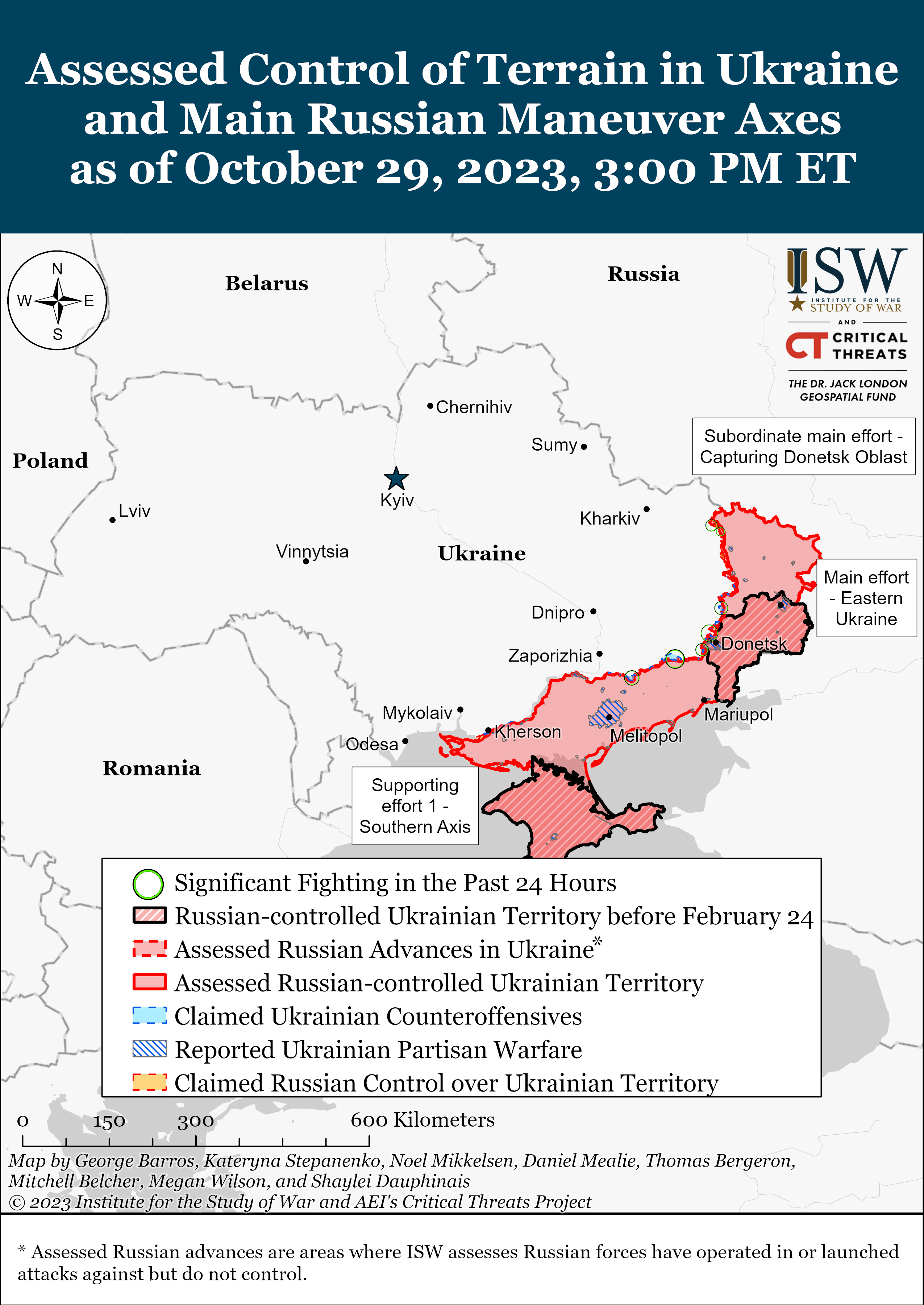
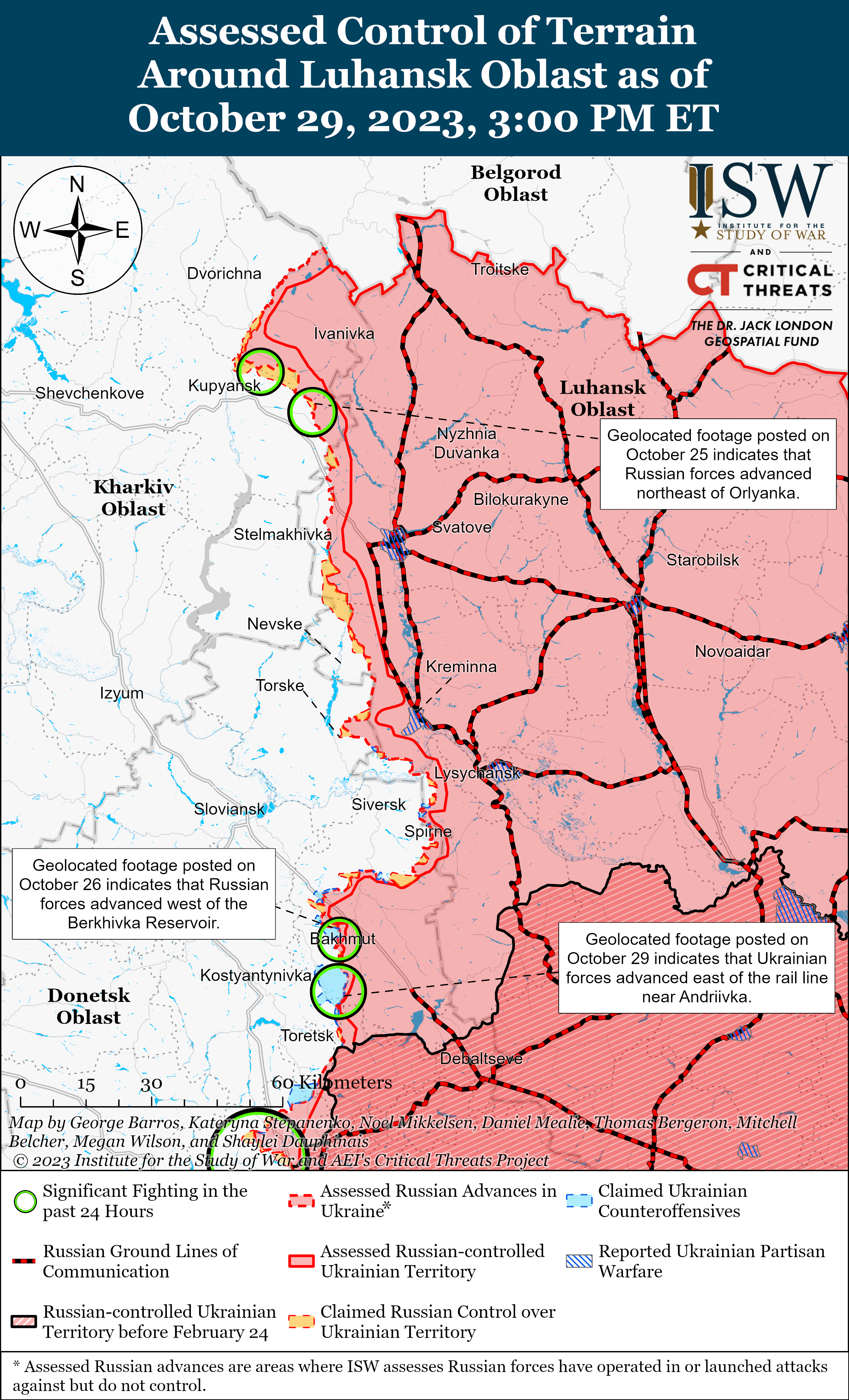
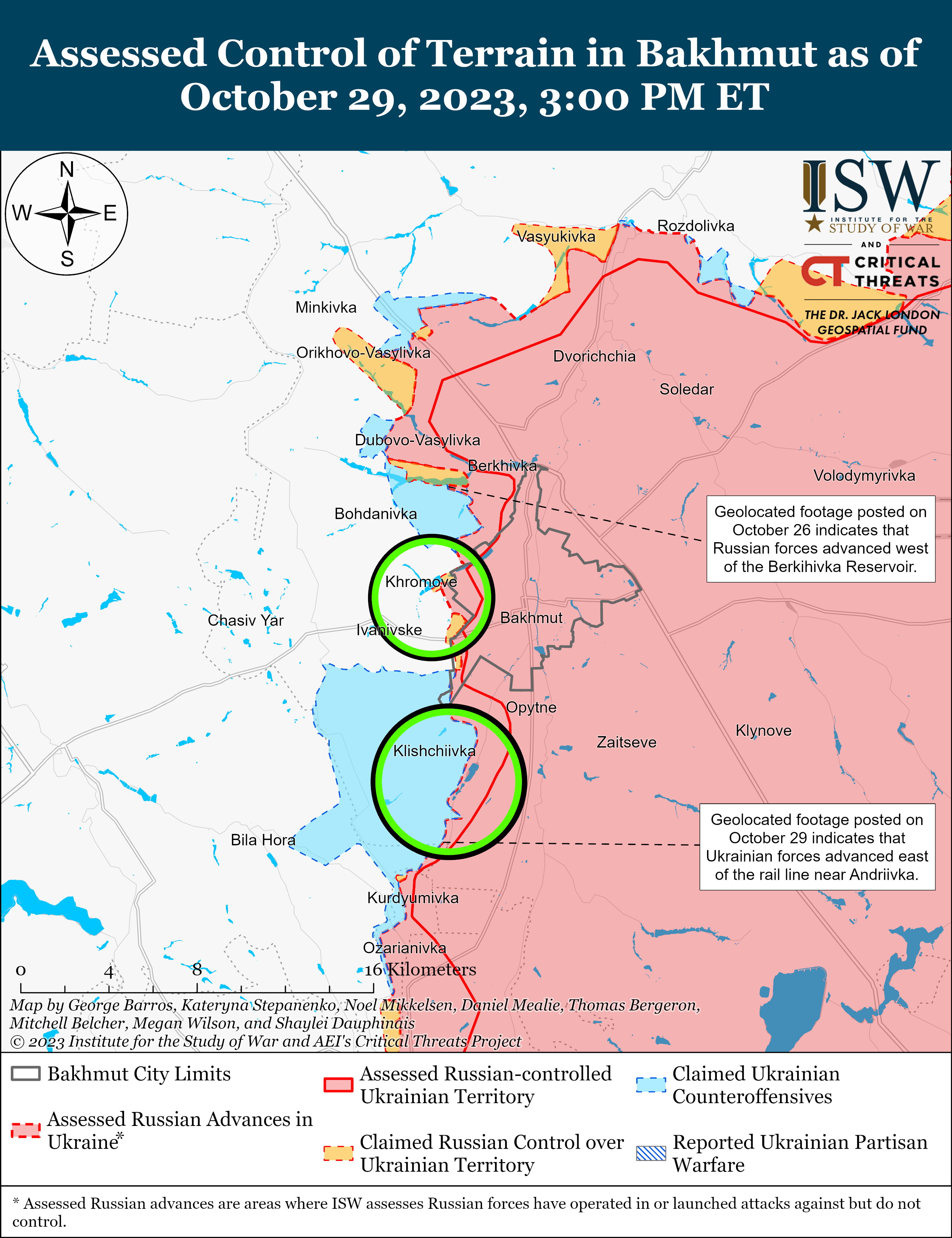
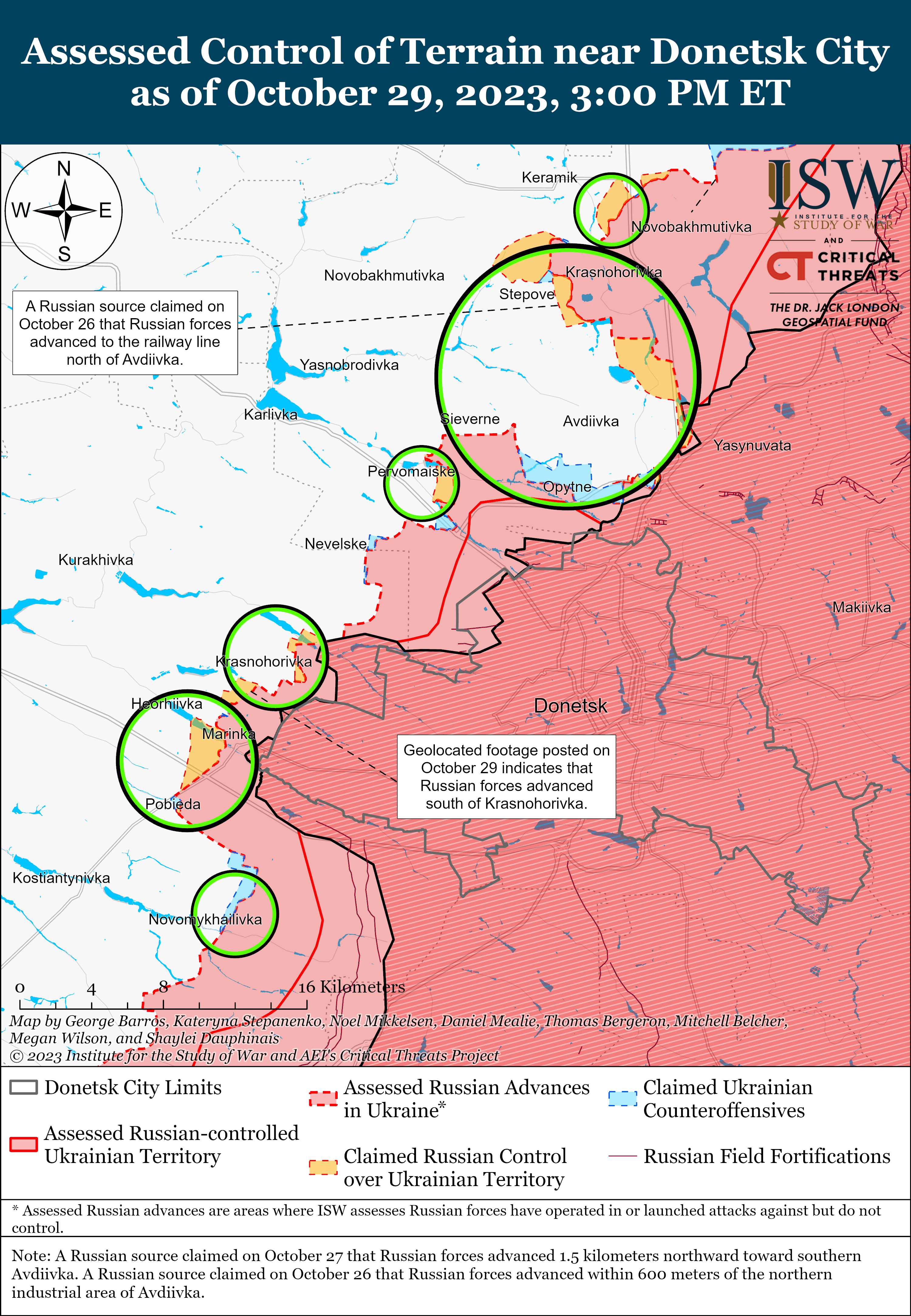
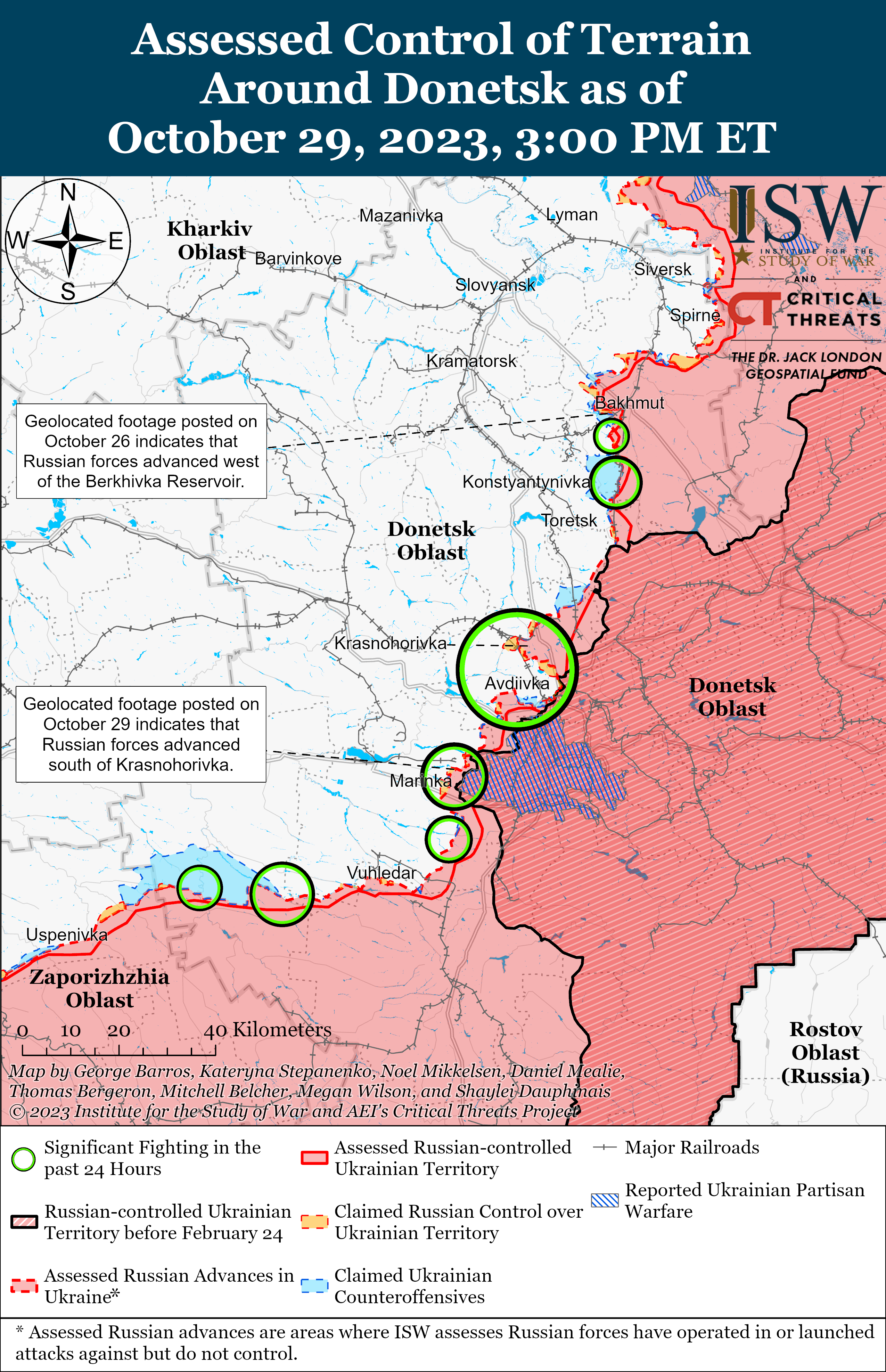
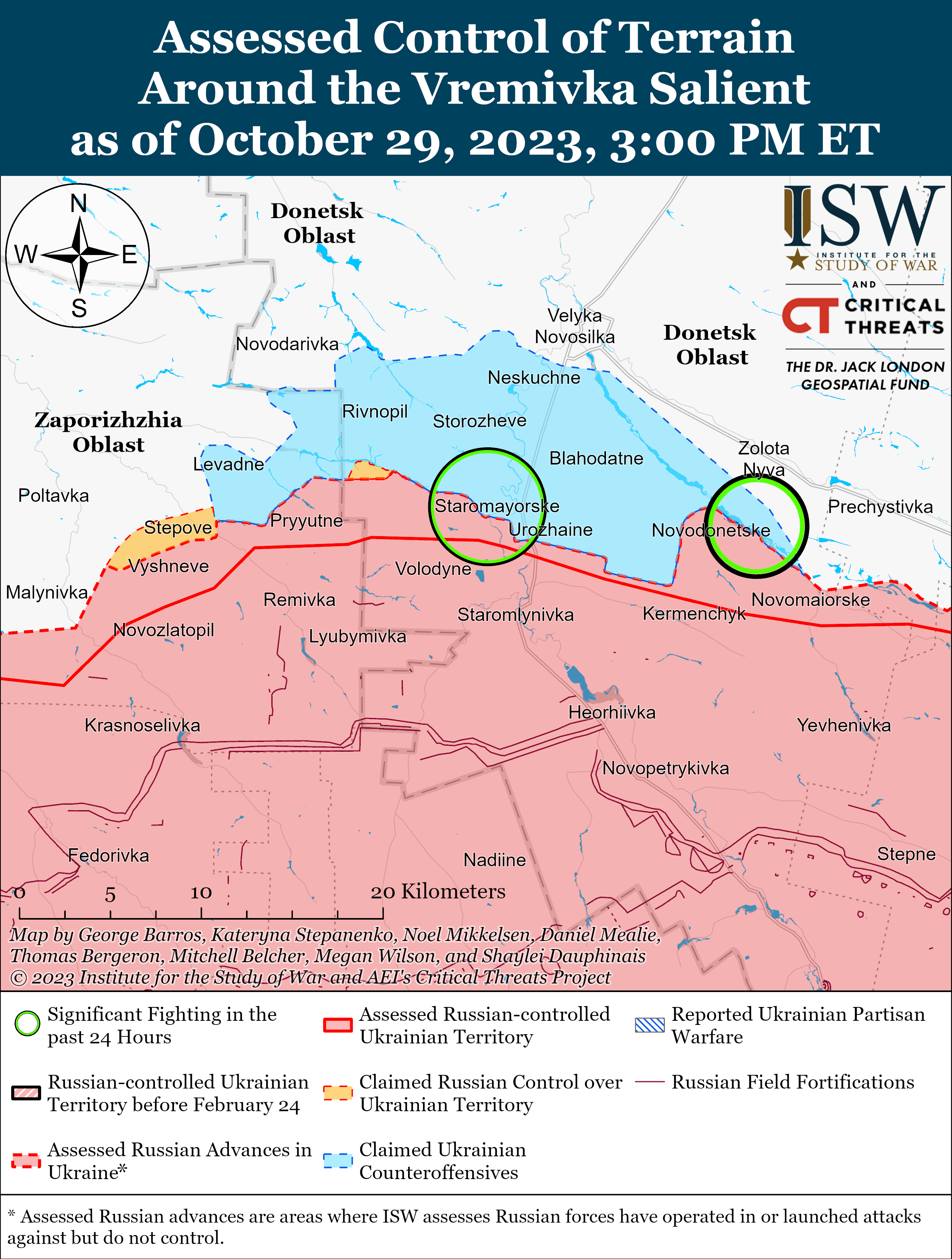
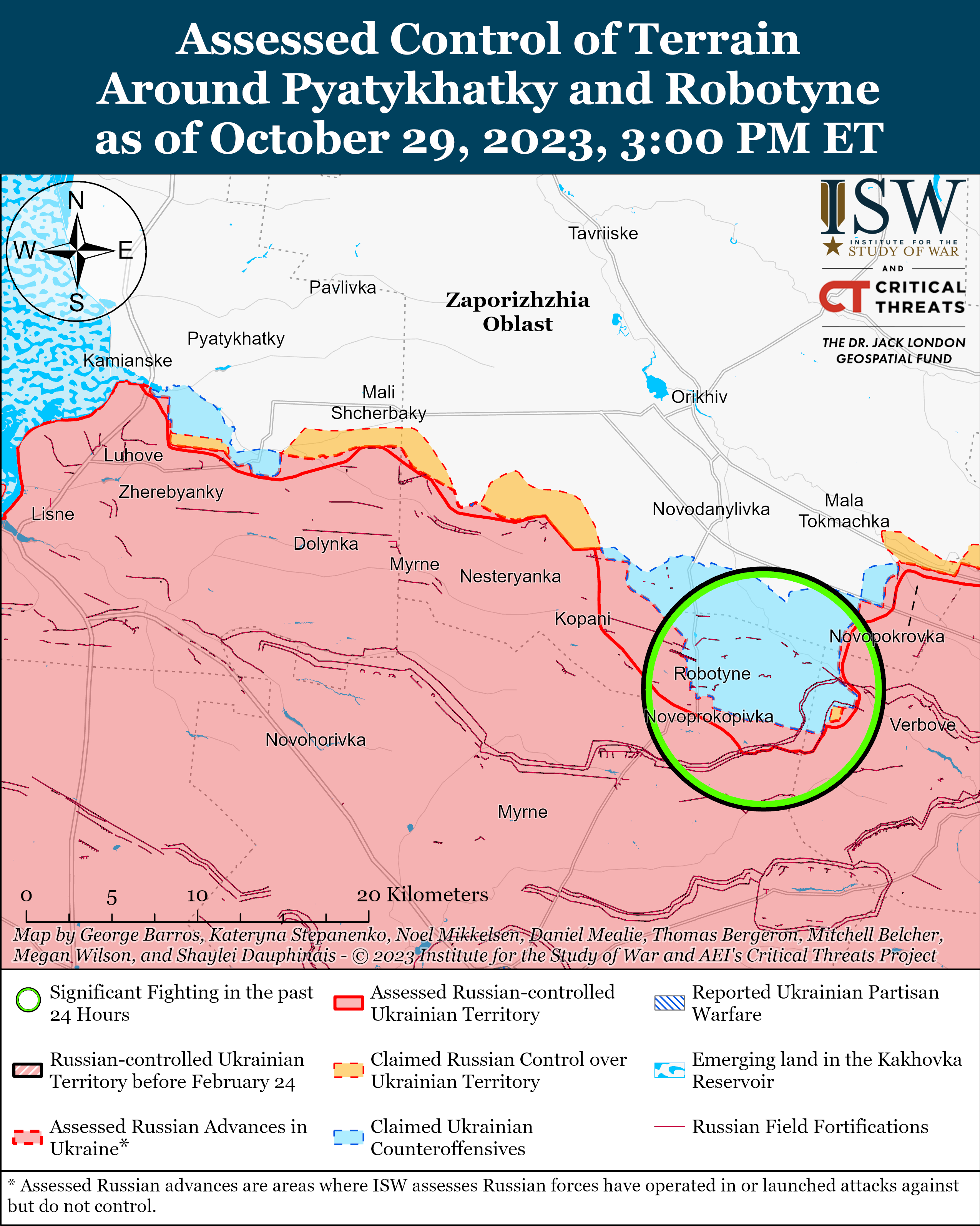
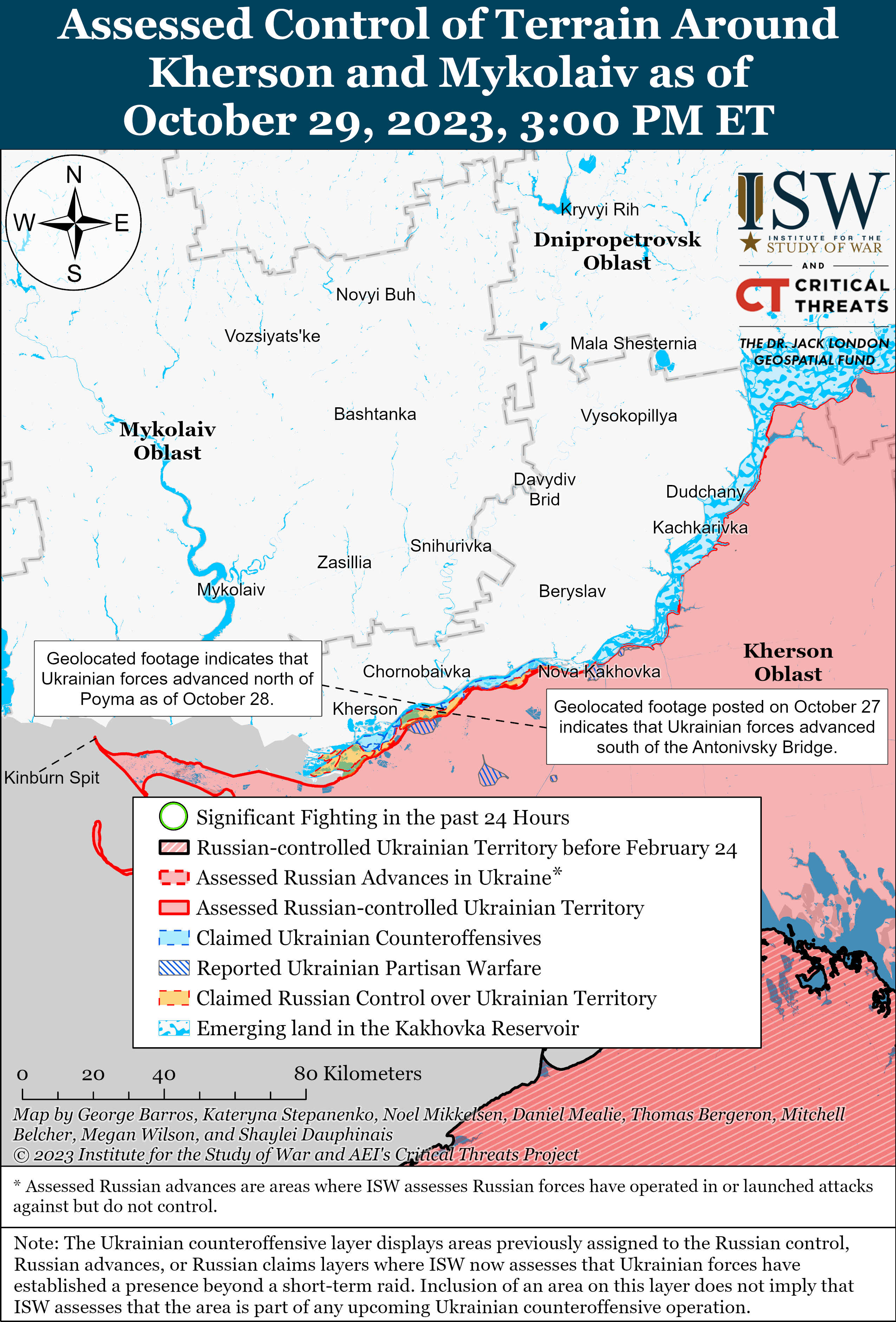
No comments:
Post a Comment